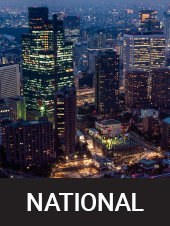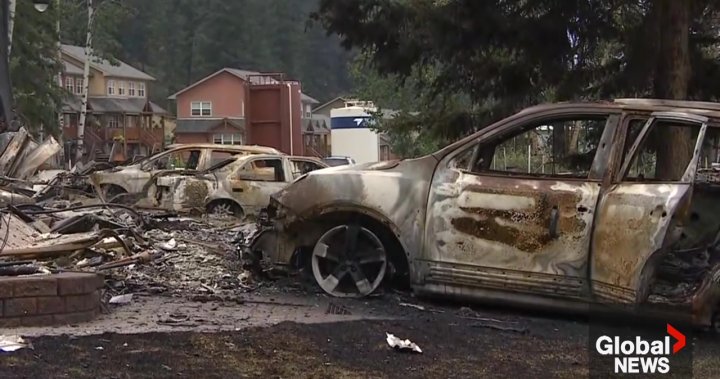For the first time since tens of thousands of people were forced to flee Jasper National Park by a wildfire that then went on to destroy about a third of the Alberta mountain town, a clearer picture is emerging of the devastation.
On Friday, Premier Danielle Smith and other officials were taken on a tour of the townsite where flames destroyed hundreds of properties — mainly residential homes — earlier this week.
Jasper Mayor Richard Ireland was there. Before departing, he spoke about how he didn’t know what to expect emotionally, but imagined it could be extremely painful.
“On behalf of the community, it’s important that I go and get a sense of what we have to work with,” he said in a candid interview.
“Where the fire did the most damage — that’s where my home is. So it’s likely to be jarring and I’m doing my best to prepare myself for it. How I will react, though, remains to be seen.”
On the tour, the worst was confirmed — Ireland’s home was gone.
Alberta Premier Danielle Smith, Forestry Minister Todd Loewen and Federal Emergency Preparedness Minister Harjit Sajjan look on as Jasper Mayor Richard Ireland looks at the ruins of his family home of 67 years destroyed by wildfire.Friday, July 26, 2024.
Global News
“This was your family home?” Premier Smith asked as the group stood on the street, looking at the remains.
“Yes, for 67 years,” Ireland replied quietly.
“Oh my gosh…I can’t even believe it,” Smith replied in shock. Ireland replied that he could now relate to his neighbours.
“I can now speak to those residents who are in same spot… I feel your pain.”
All that was left of the house was the foundation and chimney. As he looked down into the basement, Ireland spotted the ruins of possessions, including a filing cabinet.
“I see memories of life taken,” he said, pausing to take in the scene of the home his family had lived in since he was two years old. “I see 67 years.”
“So many others are going go through this same thing.”

Charred foundations where homes once stood for decades.
Breaking news from Canada and around the world
sent to your email, as it happens.

Get breaking National news
For news impacting Canada and around the world, sign up for breaking news alerts delivered directly to you when they happen.
Scorched frames of what were once family vehicles.
The shell of a Petro-Can gas station countless travellers stopped to fuel up at during mountain road trips.
Construction equipment tearing down the remains of The Maligne Lodge, where one of the first images of the fire emerged Wednesday night.
And then, other homes left standing in the midst of destruction.
It’s sadly, become an all-too-familiar scene in Alberta, where wildfires also left a similar path of destruction in Slave Lake in 2011 and Fort McMurray in 2016.
Premier Smith spoke about the loss after returning from Jasper to Hinton, where she spoke with Global News on Friday evening.
“It’s hard to see… I think people need to prepare themselves,” Smith said. “The areas that have been hit by fire are heavily, heavily damaged.”

Smith said it was still an active fire scene. A news camera was on the tour and captured crews working to put out hot spots on the southwestern side of town, where the devastation is centered.
Parks Canada and Smith said earlier Friday that about 30 per cent, or a third, of the community was either damaged or destroyed.
Out of a total of 1,113 structures within the town, Parks Canada said 358 have been destroyed.
All critical infrastructure in Jasper was saved, including the hospital, emergency services building, both elementary and junior/senior schools, activity centre and wastewater treatment plant, Parks Canada said.

Amid high winds, the main fire of concern to the south of town blazed a path of destruction through the valley, moving about five km in a matter of an hour or so.
Officials estimated the flames moved 15 metres a minute as the crown fire jumped from treetop to treetop, reaching hundreds of metres in the air.
“The circumstances were such that despite all of that preparation, the nature of this fire was such that it humbled the humans on the ground,” Ireland said.
“They did everything they could. They are professionals. They knew what they were doing. They had the resources. They did what they could. But in the face of all that, nature prevailed.”
Ireland said the residents of Jasper are not unaware of the risks and believes Parks Canada, who holds jurisdiction over the mountain park in western Alberta, had done all it could in the past decade to mitigate the threat.
“We live in a forested mountain community. Most of us live there by choice. We love that environment. It is our home and our recreation and we want to be in the mountains.
“We want to be in nature and that means our community is exposed to the threat of wildfire.”

Efforts have been made to remove trees killed off by the mountain pine beetle, whose advancement further east into Alberta was stopped a few years ago thanks to some hard winters that killed off the destructive insect.
But not before the damage had been done.
“The condition of the forest (is) absolutely affected by (the) pine beetle, but on such a massive scale that it would be unreasonable to think that we could have prepared. The preparation that was done was done thoughtfully and professionally.”
Parks Canada estimates the wildfire is estimated to have blazed through 36,000 hectares.

© 2024 Global News, a division of Corus Entertainment Inc.



